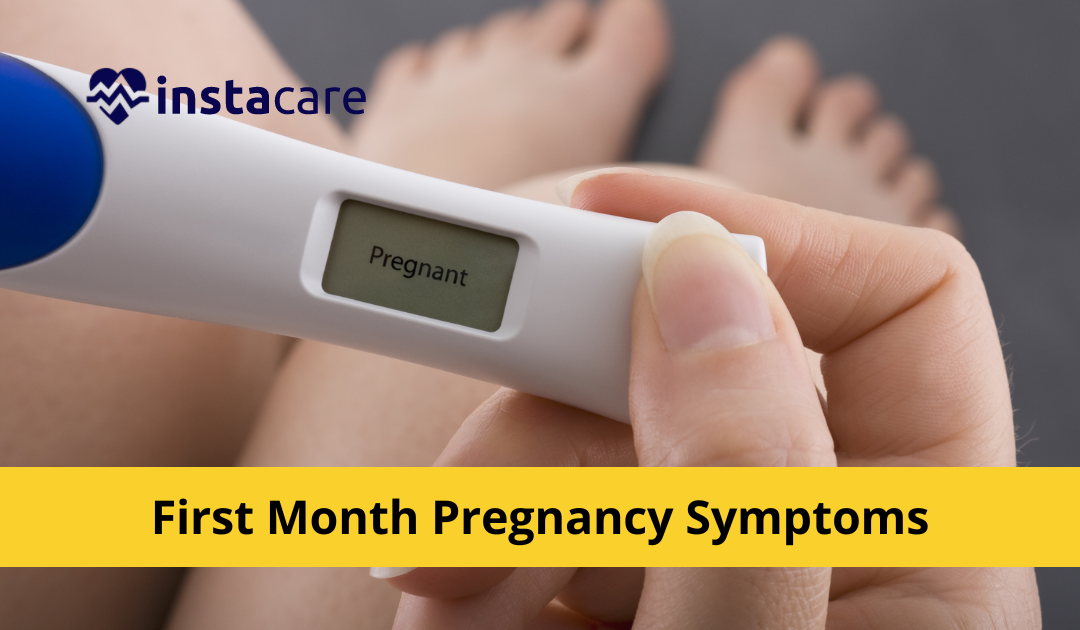You might have become concerned that you might be pregnant after noticing some physical changes. Besides your period being late, you might not have noticed any other very early signs of pregnancy one week. You should probably perform a home pregnancy test if you have any doubts. Suppose the outcome is favorable. Congrats! Learn more also about the early signs of pregnancy and your baby's development at one month pregnant.
Common Pregnancy Symptoms At One Month Pregnant
There are some 1 Month Pregnant indicators that can include:
1- Missing A Period
The sudden realization that you've missed a period can evoke a whirlwind of emotions - from panic to disbelief, and from relief to curiosity. What once seemed like a monthly inconvenience suddenly becomes an unexpected concern, urging you to dive into the labyrinth of your own bodily functions to find answers. As the subtle possibility of pregnancy lingers in the air, so too does the mystery surrounding hormonal imbalances, lifestyle factors, or underlying health conditions that may be responsible. And while the emotional turmoil rises and falls, the crucial moment arrives when you must brave the unknown, continue exploring, and ultimately confront the truth behind the missing period. It serves as a potent reminder that our bodies are complex and powerful, capable of tying together every thread of our lives and weaving stories we cannot always predict. This is possibly the most obvious sign of pregnancy if you have a normal menstrual cycle. If your period is also late or doesn't come, you might think you might be pregnant.
2- Mood Swings
Your hormone levels increase dramatically when you become pregnant, occasionally making you feel more sentimental than usual. When you learn you are pregnant, it's typical to feel various emotions, from anxiety and overwhelm to excitement and elation. Discuss your feelings with your loved ones, and consult your healthcare professional if you have any worries.
3- Cramps
Some expectant mothers experience brief uterine cramping in the first few days and weeks of pregnancy. Sometimes, these feelings can mimic menstrual cramps, leading you to believe that your period is about to start. Ask your doctor to recommend effective pain relief methods if cramps hurt or are bugging you.
View More: How To Get Pregnant With Twins
4- Spotting
Spotting may be the Symptom of early pregnancy. It could be embryo bleeding if you see a few bloody splotches on your underwear. This gentle staining can occur when the fertilized egg implants itself in the uterus cavity early in pregnancy. A panty liner can be beneficial in preventing leaks.
5- A Lot Of Urination
The quantity of blood in your body begins to rise when you become pregnant. As a result, your kidneys must work extra hard to handle the extra fluid, which eventually collects in your bladder. This may not be among the early pregnancy symptoms that ultimately go away. While staying hydrated is important, don't reduce your fluid intake. Instead, consider urinating before leaving the house or whenever you need to be away from a restroom for an extended period, such as before a meeting or a road trip.
6- Fatigue
Feeling slightly more exhausted than usual is not uncommon, and the hormone progesterone may be held responsible. Try to relax as much as you can, and remember that many expectant mothers suddenly become more active once they reach the second trimester.
7- Nausea
The notorious morning sickness, which can cause nausea and vomiting, typically doesn't start until after the first month of pregnancy. However, some expectant mothers may experience it a little earlier, and some fortunate women may never feel any nausea or vomiting related to early pregnancy. To help settle your stomach, try to stay refreshed, take a vitamin supplement, and drink ginger ale or ginger tea.
View More: Can A Woman Get Pregnant After Menopause
8- Constipation
As your hormone levels rise, your digestive system may become slower, which may explain why you feel a little congested. Iron-containing prenatal vitamins could also play a role. Consult your healthcare provider for suggestions to help things get back on track.
9- Food Intolerances
You might notice that certain tastes and odors don't appeal to you as much when you're first pregnant. Morning sickness can occasionally accompany nausea when you are around certain foods and odors. When cooking, use a kitchen fan, and if certain smells bother you, ask your spouse to take out the trash.
10- Frequent urination
Frequent urination may seem like a trivial issue, but it can significantly impact our daily lives, relationships, and overall well-being. Imagine constantly feeling the need to empty your bladder, sometimes even multiple times within an hour, disrupting your sleep, work, or social activities. This could lead to embarrassment, anxiety, and a decline in the quality of life. While it is essential to understand that everyone's bathroom habits may vary, frequent urination may also indicate underlying health issues such as urinary tract infections, diabetes, or prostate problems. It is crucial to keep track of how often you're going and consult a healthcare professional if the frequency is causing discomfort or distress. A holistic approach, including lifestyle changes and medical interventions, can help alleviate the symptoms and restore normalcy to your life. Let's all engage in open dialogue and awareness surrounding this widely prevalent issue, shedding the taboo and fostering a supportive environment for those affected.
11- Sore or Tender Breasts
Experiencing sore or tender breasts is both a common and discomforting phenomenon that affects many people, particularly women, during various stages of their lives. This tenderness can often be associated with hormonal changes, such as a woman's menstrual cycle or pregnancy, leaving her breasts feeling swollen, heavy, and highly sensitive. In some cases, it can be a result of mundane factors like ill-fitting bras or excessive exercise, leading to pain and discomfort. However, it is crucial to be attentive to any unusual or persistent changes in order to identify potential health concerns, including infections or other medical conditions that require attention. Understanding and addressing the factors behind sore or tender breasts can greatly contribute towards better breast health, enabling one to live a more comfortable and confident life.
12- Headaches and Back Pain
Headaches and back pain might not seem related at first, but these two aches often go hand-in-hand, impeding our daily lives and leaving us yearning for relief. Interestingly enough, both types of discomfort can have underlying causes that connect them, such as poor posture, stress, tension, and more. In our increasingly sedentary lifestyles, it's easy to understand why these ailments are so common. Whether it's sitting at a desk for prolonged periods during work or bending over a smartphone, our bodies were not meant for such excessive strain. The good news is that with proper awareness and a few simple lifestyle changes, such as incorporating exercise or adopting ergonomic habits, one can effectively alleviate and even prevent these pesky pains. Understanding the interaction between headaches and back pain opens up new vistas for remedies and relief, providing hope to those who suffer on a daily basis.
How Quickly Should Test For Pregnancy?
Human chorionic gonadotrophin (hCG) can be found in small amounts in your urine, which is how pregnancy tests work. Once your period has been missed, you can test for pregnancy. To get the most accurate results, it's best to wait at least a week after missing your period. Even though some tests promise to be accurate just before a missed period, taking one too soon can lead to a false negative (the test indicates that you are not pregnant, even though you are).
Even one week before a missed period, your doctor can take a blood sample to check for pregnancy.
Finally
At one month pregnant, you're about to experience something significant that could be both exhilarating and terrifying. In your uterus, your Fetal Development is going fast, but any baby bump you may notice at this point is probably just hormonal bloating rather than actual baby growth. Even so, many new things are occurring, so plan your delivery date, get as much rest as possible, and make an effort to maintain your composure.
Please book an appointment with the best Gynecologist in Lahore, Karachi, Islamabad, and all major cities of Pakistan through InstaCare, or call our helpline at 03171777509 to find the verified doctor for your disease.
Source: https://instacare.pk/blog/1st-month-pregnancy-symptoms












